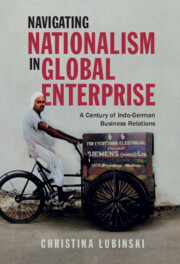Book contents
- Navigating Nationalism in Global Enterprise
- Cambridge Studies in the Emergence of Global Enterprise
- Navigating Nationalism in Global Enterprise
- Copyright page
- Dedication
- Contents
- Figures
- Tables
- Acknowledgments
- Introduction
- Part I Nationalism and Competitive Dynamics
- Part II Emergent Strategy in a World of Nations
- 5 Refining Political Capabilities
- 6 Planning for Uncertain Futures
- 7 Stability in a Wobbly World
- 8 Reimagining the World in Stages
- Conclusion: Rehistoricizing Nations
- Appendices
- Bibliography
- Index
5 - Refining Political Capabilities
from Part II - Emergent Strategy in a World of Nations
Published online by Cambridge University Press: 27 October 2022
- Navigating Nationalism in Global Enterprise
- Cambridge Studies in the Emergence of Global Enterprise
- Navigating Nationalism in Global Enterprise
- Copyright page
- Dedication
- Contents
- Figures
- Tables
- Acknowledgments
- Introduction
- Part I Nationalism and Competitive Dynamics
- Part II Emergent Strategy in a World of Nations
- 5 Refining Political Capabilities
- 6 Planning for Uncertain Futures
- 7 Stability in a Wobbly World
- 8 Reimagining the World in Stages
- Conclusion: Rehistoricizing Nations
- Appendices
- Bibliography
- Index
Summary
Chapter 5 follows German business strategy and Indo-German collaboration through the Great Depression and its aftermath. The depression ended India’s open-door policy and introduced preferential tariff treatment for British goods. At the same time, the German political landscape changed significantly with the Nazi Regime (1933–1945), re-shaping both German economic policies but also MNE’s export strategies. There was widespread antipathy in India towards the lawlessness and anti-Semitism of Hitler’s government, including some boycotts against German goods. But German businessmen also became savvier in understanding the fine-grained differences of economic nationalism in India and developed more targeted strategies to exploit them. It was at this time that they invested heavily in business intelligence as a basis for strategic decision-making. Moreover, the German Reichsbank started a system of subsidizing German exporters, which helped them to regain some competitiveness despite Germany staying on the gold standard. Giving up much of the bazaar business, German business in India focused more than ever before on the industries that were seen as complementary to Indian activists’ agenda, most notably chemicals, electrical goods and machinery.
Keywords
- Type
- Chapter
- Information
- Navigating Nationalism in Global EnterpriseA Century of Indo-German Business Relations, pp. 127 - 156Publisher: Cambridge University PressPrint publication year: 2022



